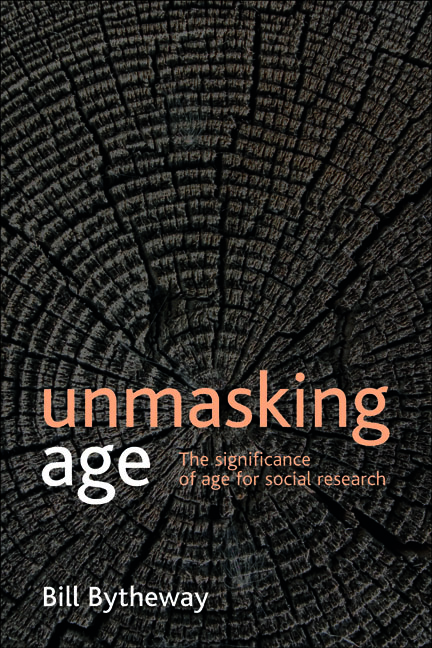Book contents
- Frontmatter
- Dedication
- Contents
- List of figures and tables
- Acknowledgements
- one Introducing age
- two Researching age
- three Age and time
- four Representations of age
- five Growing older in an ageing body
- six Being older
- seven A great age
- eight The ageing population
- nine Gerontologists and older people
- ten Getting real
- Postscript
- Notes
- Appendix
- References
- Index
five - Growing older in an ageing body
Published online by Cambridge University Press: 07 September 2022
- Frontmatter
- Dedication
- Contents
- List of figures and tables
- Acknowledgements
- one Introducing age
- two Researching age
- three Age and time
- four Representations of age
- five Growing older in an ageing body
- six Being older
- seven A great age
- eight The ageing population
- nine Gerontologists and older people
- ten Getting real
- Postscript
- Notes
- Appendix
- References
- Index
Summary
We are all growing older and our bodies, slowly but surely, are constantly ageing. So we all have some first-hand experience of what this entails. But only up to a point: our understanding of what it is like to be older than we are currently is, necessarily, only second-hand knowledge gained through observing and listening to our elders. And what older people tell us about being the age they are is, of course, loaded with all sorts of emotions. ‘When you’re my age, then you’ll understand …’ is a classic put-down that reasserts the authority of personal experience.
In Chapter Six I consider relative ages and the significance of age differences. In this chapter I first consider the significance of lived experience in understanding how people account for age, and then I move on to the business of living in an ageing body. In the second half of the chapter I contrast how the annual routines of life such as birthdays signify the ageing of the self, before finally considering evidence of the impact of transforming experiences on the course of life.
It is important to recognise how, both at the cultural and individual levels, growing older is something that is paradoxically both resisted and accepted as inevitable. It follows that there is always a tension surrounding debates and discussions about ‘the reality’ of age.
Experience
Experience is a concept that should be fundamental in gerontology. In Bytheway (1996a) I sought to make a clear distinction between experience of the ways of the world and the lived experience of growing older, arguing that this distinction should be incorporated into social theories of ageing. On the one hand we gain experience by observing and learning from others; and on the other we ourselves experience and survive a wide range of challenges and life transitions. In the inter-generational conflicts that often characterise work relations, it is the experience of the older worker that is challenged by the up-to-date expertise of the newly trained; tried and tested methods set against innovations and new resources. In the broader historical picture, the older worker loses, of course, and traditional methods are adapted or abandoned.
- Type
- Chapter
- Information
- Unmasking AgeThe Significance of Age for Social Research, pp. 91 - 116Publisher: Bristol University PressPrint publication year: 2011



